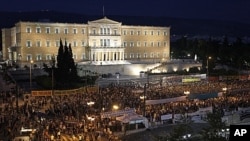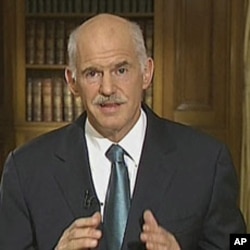The European Union's top economic official says he expects eurozone finance ministers to sign off on the payout of $17 billion in aid for Greece on Sunday and decide on a new bailout in July. The news comes on the heels of the prime minister of Greece reshuffling his Cabinet in an effort to push through a tough austerity package that has many Greek citizens in uproar.
EU Economic Affairs Commissioner Olli Rehn said Thursday the two-step approach means that the funding of the Greek debt can now be ensured until September, saving it from the immediate risk of default. But, he said, a decision on a new longer-term bailout will be delayed until July amid disagreement over the role of private investors.
Rehn said it was "regrettable" that the efforts to build national unity in Greece failed Wednesday, but that he still expected parliament to pass new austerity measures.
On Wednesday, Greek citizens came out in the tens of thousands to protest the measures that Prime Minister George Papandreou is determined to push through parliament.
Papandreou responded by saying he will reshuffle his Cabinet and seek a vote of confidence for his new government in parliament. Papandreou added he will continue on what he called the "road of duty," together with his party members, officials, and the Greek people.
His plan to reshuffle the Cabinet came on the same day that anti-austerity riots hit Athens and coalition talks with the opposition failed.
Even some members of Papandreou's Socialist party are not behind his measures. On Thursday, two lawmakers from his party stepped down.
In Greece, the reaction to Papandreou's policy was mixed. A recent poll carried out by a market research company called Public Issue showed the main opposition party is beating the ruling Pasok socialist party in voter support.
Greek citizen Amalia Stinga says the prime minister is not making the effort he needs to make. She believes Papandreou is afraid. She adds that if he were not afraid, he would have done things differently.
Greece is in major debt and unable to pay back the money it owes. Last year, the European Union and the International Monetary Fund (IMF) pledged multi-billion-dollar loans in order to help Greece out of its financial troubles. But that money is conditional upon a tough austerity program.
Simon Tilford, chief economist at the Center for European Reform, based in London, says the current political turmoil in Greece was unavoidable given the terms set by the EU and the IMF.
"What they are trying to do is almost impossible economically," noted Tilford. "The Greeks have met the terms of their fiscal austerity program. They have cut public spending by more than any other developed economy has ever done in such a short space of time. But because those public spending cuts have hit economic growth harder than the EU or the IMF thought they would, they are still in breach of their agreement."
Tilford adds that there is a limit to how much any country can cut spending. And right now, spending cuts are only serving to stifle the Greek economy. He calls the situation a "death trap."
"Unless there is a change of track by the EU and the IMF, further political instability is all but guaranteed," Tilford noted.
On Thursday, world stocks hit a three-month low and the euro slumped to a one-month low.





